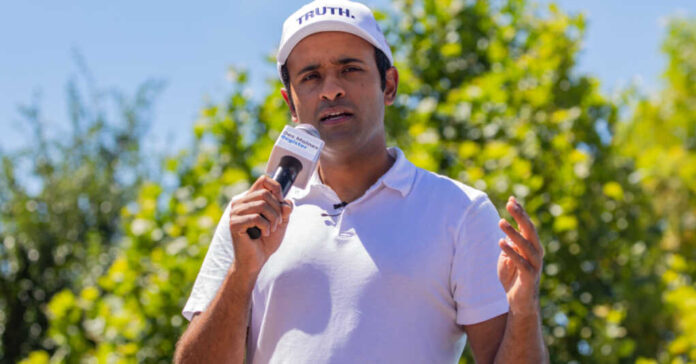
Immigration reform and securing the nation’s borders against further invasion are hot-button topics Republican candidates face moving into the 2024 presidential election. An August 2023 poll, conducted by the Center Square Voter’s Voice, revealed that 82% of voters from both Republican and Democratic voting bases are concerned with the chaos at the border.
Vivek Ramaswamy, considered to be a serious contender in the upcoming Republican primary, has stated that he would deport American-born children of undocumented immigrants along with their families if he wins the presidency.
Ramaswamy isn’t alone in his view. Florida Governor Ron DeSantis unveiled a new border policy, citing birthright citizenship as being “inconsistent with the original interpretation of the 14th Amendment.” Former President Donald Trump pledged to issue an executive order discontinuing birthright citizenship for undocumented immigrants’ children if he wins the White House.
So, what is driving the controversy, and does Ramaswamy have a legal leg to stand on when making this promise?
According to the most common interpretation of the U.S. Constitution’s 14th Amendment, all children born in the U.S. are citizens, even if their parents are not. According to the 14th Amendment, “All persons born or naturalized in the United States, and subject to the jurisdiction thereof, are citizens of the United States and of the State wherein they reside.”
The 14th Amendment was adopted in 1868, overturning a Supreme Court of the United States ruling that barred slaves and freed African Americans from claiming U.S. Citizenship.
Ramaswamy argues that the 14th Amendment doesn’t apply to illegal immigrants, however, because Illegal immigrants are not “subject to the jurisdiction” of the United States. Following this theory. Ramaswamy and other like-minded conservatives feel that children of illegal immigrants do not have an automatic right to citizenship at birth, making it legal and constitutional to deport the entire family.
The legal argument has several points that seem to support Ramaswamy’s views.
The 14th Amendment’s Citizenship Clause states that people born in the United States and “subject to the jurisdiction thereof” are citizens. Some legal experts point out that this language was specifically meant to exclude individuals who were not under U.S. jurisdiction, such as diplomats or foreign invaders. They claim that it was not intended to grant citizenship to the children of undocumented immigrants.
Some experts argue that the framers of the 14th Amendment did not intend to grant automatic citizenship to children born to parents who were in the country without legal status. They contend that the amendment was primarily aimed at ensuring citizenship for former slaves and their descendants, as well as other groups born in the United States.
Many opponents of birthright citizenship for “anchor babies” assert that the power to regulate immigration and naturalization is vested in the U.S. Congress by the Constitution. They argue that Congress has not explicitly granted citizenship to children born to undocumented immigrants and that any such policy should be determined through congressional legislation.
Moreover, experts observe that the Supreme Court has never issued a definitive ruling on the context and meaning of the 14th Amendment and that SCOTUS needs to clarify its interpretation.
Ramaswamy faces a difficult path to constitutionally accomplish his goal of deporting children born to illegal immigrants on American soil. Amending an amendment requires a high level of political consensus and follows the same process as creating a new amendment. This involves proposing the amendment through Congress or a constitutional convention, followed by ratification by three-fourths of state legislatures or state conventions.
Legal challenges and court reviews will also be involved, further delaying the process.
Trump has indicated that he would dismantle the “birthright citizenship” clause in the 14th Amendment, but contrary to what the Biden administration believes, a president cannot issue an executive order that defies the Constitution. The courts, including the U.S. Supreme Court, have the authority to review the constitutionality of executive orders, and they can declare such orders invalid if they violate the Constitution. This means that changing the Constitution itself is the only way to dismantle the prevalent interpretation of the 14th Amendment.
And, without the support of Democrats, that will never happen.
One might expect progressives to applaud Ramaswamy’s ideas. They’re known for opposing policies that split illegal immigrant families apart. If Ramaswamy can follow through on his promises, the whole family of illegal immigrants may indeed stay united—just on the flip side of America’s borders.







